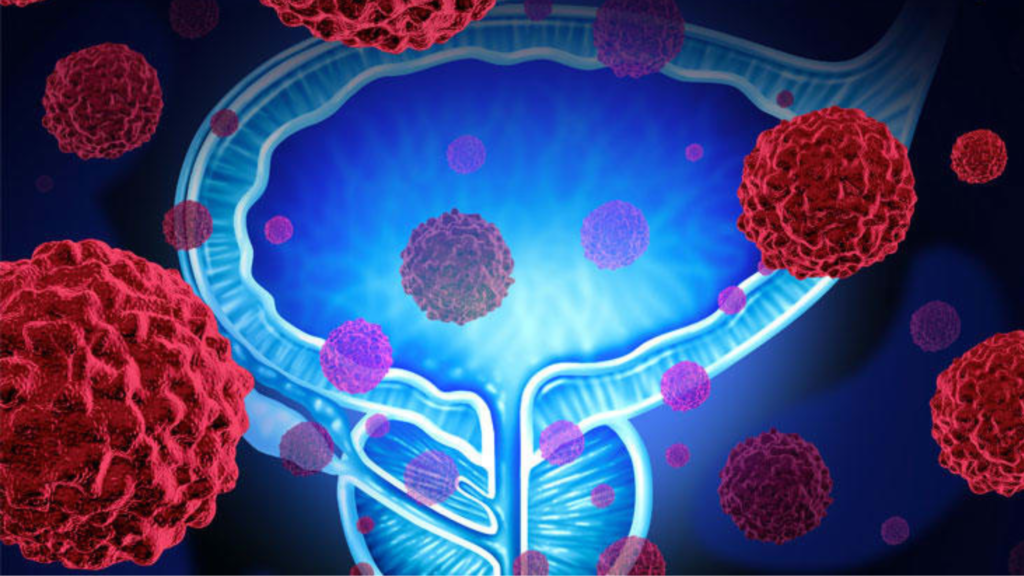
In the complex view of cancer research and treatment, few challenges are as daunting as metastatic prostate cancer. As we embark on a journey to learn more about metastatic prostate cancer, we turn to Dr. Sharma’s expertise, seeking insights that transcend the boundaries of conventional knowledge.
Metastatic prostate cancer represents a pivotal crossroads in the lives of those affected, demanding a nuanced understanding of its nuances, causes, diagnostic approaches, and evolving treatment modalities. Dr. Sumit Sharma, with his wealth of experience and commitment to advancing the frontiers of prostate cancer research, serves as our guide for metastatic prostate cancer. Join us as we delve into the realms of biology, diagnosis, treatment, and the human experience, gaining a comprehensive understanding of this formidable adversary from the perspective of a seasoned oncologist.
Overview of Prostate Cancer
The prostate, situated just below the bladder and in front of the rectum, plays a vital role in the male reproductive system. Its primary function is to produce seminal fluid, which nourishes and transports sperm during ejaculation. Despite its crucial role, the prostate is susceptible to the development of cancerous cells.
Prostate cancer, a prevalent and complex disease, arises in the prostate gland—a small, walnut-sized organ integral to male reproductive function.
Localised vs. Metastatic Prostate Cancer
Prostate cancer typically manifests in two primary forms: localised and metastatic. In its localised state, cancer cells are confined to the prostate gland. However, when cancer cells proliferate beyond the prostate, infiltrating nearby tissues or spreading to distant organs, the condition becomes metastatic. Dr. Sharma elucidates the critical distinctions between these stages, as they have profound implications for treatment planning and prognosis.
Causes and Risk Factors of Metastatic Prostate Cancer
Metastatic prostate cancer, the advanced and formidable stage of this prevalent disease, involves the spread of cancer cells beyond the prostate gland. Dr. Sumit Sharma sheds light on the interplay of causes and risk factors, providing a nuanced understanding that is crucial for both prevention and early intervention.
Age and Hormonal Influences
Age stands as a prominent risk factor for prostate cancer, with the incidence rising significantly after the age of 50. The biological underpinnings, emphasise how age-related changes in the prostate gland, including hormonal shifts, contribute to the heightened risk.
Genetic Predisposition
Understanding one’s family history is paramount in assessing prostate cancer risk. The role of genetic factors, emphasises that individuals with close relatives diagnosed with prostate cancer face an elevated risk. Advances in genetic testing provide valuable insights into inherited mutations that may predispose individuals to the disease.
Lifestyle and Environmental Factors
The impact of lifestyle choices on prostate cancer risk cannot be overstated. Influence of dietary habits, emphasizing the potential protective effects of a diet rich in fruits, vegetables, and certain nutrients. Conversely, the role of factors such as obesity and exposure to certain environmental toxins is examined, providing a holistic perspective on mitigating risk.
Inflammatory Conditions and Infections
Chronic inflammation within the prostate, often associated with conditions like prostatitis, may contribute to an increased risk of prostate cancer. Links between inflammatory processes, infections, and the development of cancerous cells, highlight the importance of addressing underlying health conditions.
Staging and Grading of Metastatic Prostate Cancer
Metastatic prostate cancer, a formidable adversary in the realm of oncology, demands precise staging and grading for effective management. Dr. Sumit Sharma, a distinguished expert, provides invaluable insights into the nuanced processes of determining the extent and aggressiveness of this advanced disease.
Staging
Staging serves as a crucial roadmap in understanding the spread of metastatic prostate cancer. The TNM (Tumor, Node, Metastasis) system, is a standardised classification that meticulously categorizes the primary tumour’s size, lymph node involvement, and the presence of distant metastases.
T (Tumour): This component evaluates the size and extent of the primary tumour within the prostate. The significance of distinguishing between localized growth and invasion into adjacent tissues.
N (Node): The involvement of nearby lymph nodes is a key determinant in cancer staging. The implications of lymph node metastasis, emphasising its impact on treatment decisions and prognosis.
M (Metastasis): The presence or absence of distant metastases is a pivotal aspect of staging. Metastatic spread to distant organs, such as bones or other soft tissues, signifies an advanced stage, necessitating tailored therapeutic approaches.
Grading
Understanding the aggressiveness of cancer cells is paramount for devising an effective treatment strategy.
Histological Examination: The Gleason score is derived from a histological examination of prostate tissue obtained through biopsy. Pathologists assess the patterns of cancerous cells, assigning grades based on their architecture.
Scoring System: The Gleason score ranges from 6 to 10, with lower scores indicating well-differentiated, less aggressive cancer, and higher scores representing poorly differentiated, more aggressive forms. Treatment Approaches for Metastatic Prostate Cancer: A Roadmap to Comprehensive Care
Treatment
Metastatic prostate cancer poses unique challenges, demanding a multidimensional approach to treatment. Dr. Sumit Sharma explains the intricacies of therapeutic strategies, shedding light on the evolving landscape of care for patients facing this advanced stage of the disease.
1. Surgery: Navigating Localized Metastases
Surgical intervention plays a role in managing metastatic prostate cancer when the disease remains confined to the prostate or has limited spread. The nuances of surgeries like radical prostatectomy emphasise their potential benefits in alleviating symptoms and delaying disease progression.
2. Radiation Therapy: Precision in Targeting Cancer Cells
Radiation therapy, delivered externally or internally, emerges as a cornerstone in the treatment arsenal. The precision of modern techniques like intensity-modulated radiation therapy (IMRT) and brachytherapy, detail how these approaches aim to eradicate cancer cells while minimising damage to surrounding healthy tissues.
3. Hormone Therapy: Controlling Androgen Activity
Androgens, male hormones like testosterone, fuel the growth of prostate cancer. Hormone therapy aims to suppress androgen activity. While initially effective, the potential for resistance over time necessitates ongoing monitoring and adjustment of treatment plans.
4. Chemotherapy: Targeting Rapidly Dividing Cells
Chemotherapy, though traditionally reserved for advanced stages, plays a pivotal role in managing metastatic prostate cancer. The agents employed, emphasise their ability to target rapidly dividing cancer cells throughout the body. Combination therapies and personalized approaches are explored to enhance efficacy.
5. Immunotherapy: Harnessing the Immune System
In recent years, immunotherapy has emerged as a promising frontier in cancer treatments. Immunotherapeutic agents, such as immune checkpoint inhibitors, work to empower the body’s immune system to recognize and attack cancer cells. The ongoing research and the potential for immunotherapy to revolutionise metastatic prostate cancer care.
6. Targeted Therapy: Precision Medicine in Action
Precision medicine takes centre stage with targeted therapies. These therapies pinpoint specific molecular pathways involved in cancer growth, minimising collateral damage to healthy cells. He emphasises the importance of genetic testing to identify actionable mutations guiding treatment decisions.
7. Emerging Therapies: Hope on the Horizon
A glimpse into the future, where novel therapies and clinical trials hold promise. From PARP inhibitors to radiopharmaceuticals, the evolving landscape of metastatic prostate cancer treatment, emphasises the importance of staying informed about emerging options.
Conclusion
As we draw the curtains on this exploration of metastatic prostate cancer, guided by the expertise of Dr. Sumit Sharma, a profound understanding emerges. Dr. Sharma’s insights have illuminated the complexities of this advanced stage of the disease, offering a roadmap for both patients and healthcare professionals navigating the challenging terrain of metastatic prostate cancer.
Metastatic prostate cancer is not merely a medical challenge; it’s a journey that necessitates a multidimensional approach. From understanding the causes and risk factors to unravelling the intricacies of staging and grading, and delving into the array of treatment modalities, Dr. Sumit Sharma has been our steadfast guide. His wealth of knowledge, coupled with a commitment to advancing cancer care, empowers us to confront this formidable adversary with resilience and hope.
In the realm of metastatic prostate cancer, knowledge is not just power; it’s a source of hope and resilience. Let this knowledge inspire conversations, drive research initiatives, and ultimately contribute to a future where metastatic prostate cancer is not merely managed but conquered. Together, armed with understanding and guided by the wisdom shared by Dr. Sumit Sharma, we stride into a future where every individual facing metastatic prostate cancer finds solace, support, and the promise of progress.
Dr. Sumit Sharma is an experienced urologist, andrologist, and kidney transplant surgeon with over 20 years of clinical experience. He is the founder of the Department of Urology at multiple hospitals in Gurgaon and has established successful kidney transplant programs across the city.
With a commitment to the highest standards, Dr. Sumit Sharma ensures personalised, professional treatment, making your well-being the primary focus. Choose Dr. Sumit Sharma for outstanding Urological care in Gurgaon.



